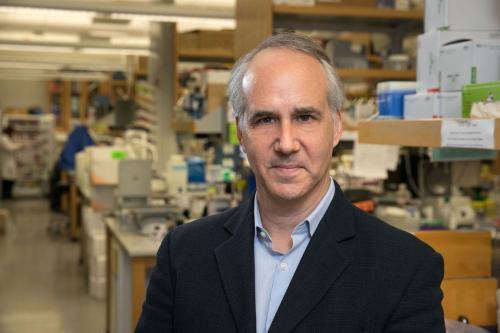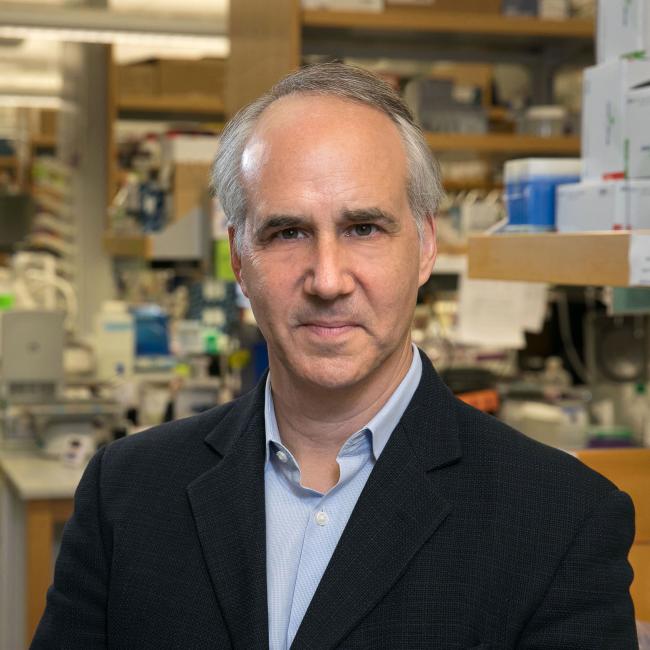
Your brain on genetics
There’s nothing like seeing new perspectives through the study of neurodegenerative and neuropsychiatric diseases. Dr. Daniel Geschwind — without getting too philosophical, he promises — is ready to explain why.
Geschwind, the Gordon and Virginia MacDonald Distinguished Professor of Human Genetics, Neurology and Psychiatry at UCLA, has been a pioneering neurogeneticist for more than 25 years, during which time a genomics revolution has allowed research, much of which has come out of UCLA, to show that psychiatric disorders have pathology that ties them together.
In the last 10 years, hundreds of genes that increase susceptibility to neuropsychiatric disorders have been discovered, establishing biological origins of such disorders and helping to erase stigmas around their existence and cause. Geschwind’s directorship of the UCLA Institute for Precision Health, where systems biology methods are applied in neurologic and psychiatric disease, has allowed UCLA researchers to lay the framework for new therapeutic development for many of these disorders.
Geschwind has been credited with shaping autism genetic research by helping to create and lead the Autism Genetic Resource Exchange — the first open-access resource for research on autism spectrum disorder. But it’s the lessons he’s learned from studying all neuropsychiatric conditions that have fed his curiosity and led him on this journey.
“The challenge with studying brain disorders is that we do not yet have a working model of the brain in which to place our findings, which is a challenge relative to disorders that impact other organs. Genetics provides a causal anchor,” he said.
In advance of delivering the 136th Faculty Research Lecture on Friday, April 19, Geschwind spoke with us about his research and the proliferation of new genetic technologies, plus why it’s so important to study the causal mechanisms making complex brain disorders prevalent in our world today.
What are some of the most surprising things you’ve discovered through your research?
If you think about schizophrenia, autism and depression, they're all essentially defined by somebody observing behavior and talking with a patient, as opposed to diabetes or high blood pressure, which are measurable. And despite that, human genetics has shown that there's quite a bit of cohesion between these things.
In other words, you can define autism by behavior and identify genes that cause autism. You can define schizophrenia based on behavior and identify genes that cause schizophrenia, etc. But what's also interesting is that you can find genes that increase risk across the board for many psychiatric disorders in tandem as well.
What does this mean for patients living with neurologic and psychiatric disorders?
Once you have identified a genetic form of a disorder, it gives you a jumping-off point for defining the mechanism of the disorder, understanding at least where it starts and maybe understanding how it unfolds so that you could then develop a treatment based on mechanism. That's what's happened in cancer.
Identifying genes the way that we look at the problem can be thought about in two directions: one is looking at the brain after the disease has happened or when it's happening, and the other is to look at a person's genome — their genetic makeup —and identify the risk factors or the susceptibility factors, and how those two approaches come together.
What excites you about what's on the frontier of your genetics research and what does it mean for medicine?
What excites me is that we have these disorders that for decades had non-scientific theories for how the disorder came about — especially autism. There were theories that it was due to “refrigerator mothers” or bad parenting. But it’s not.
Understanding the genetics gives us a true causal foothold and changes the narrative around these disorders massively so that their occurrence is not somebody's fault. In conditions like autism and schizophrenia, it shows that there is a medical condition and that the brain is an organ. By understanding genetics, we can identify causes. And once we know the causes, we can develop treatments.
What do you hope people take away from the lecture?
I hope that people take away the extraordinary hope that I have for the future that's not entirely reliant on genetics, but is fueled by genetic discoveries in diagnosis, prognosis, prevention and treatment of brain disorders.
We're in an amazing time. It's a kind of confluence of technological developments that has allowed us to sequence DNA. We can now do things that were unthinkable even a decade ago. Microfluidics and engineering have allowed us to understand genetics in single cells.
At the same time, there's been an increase in computer power. Now, when we identify a genetic target, we can also use computers to model the structure of the target to model drugs. There are also advances in computational chemistry and physics, for example, that can be applied to genetic discovery.
What was your reaction to being chosen to deliver the lecture?
Shock and surprise. It was certainly not anything I ever expected. I feel honored and humbled to do this. I'm hoping to entertain people in my own way and maybe impart some of what we've done in a way that's understandable.
That's my challenge. We're working on something that maybe a lot of people out in the world don't have daily access to, in terms of biomedicine and genetics and neuroscience, especially how the brain works, which, of course, nobody knows.
